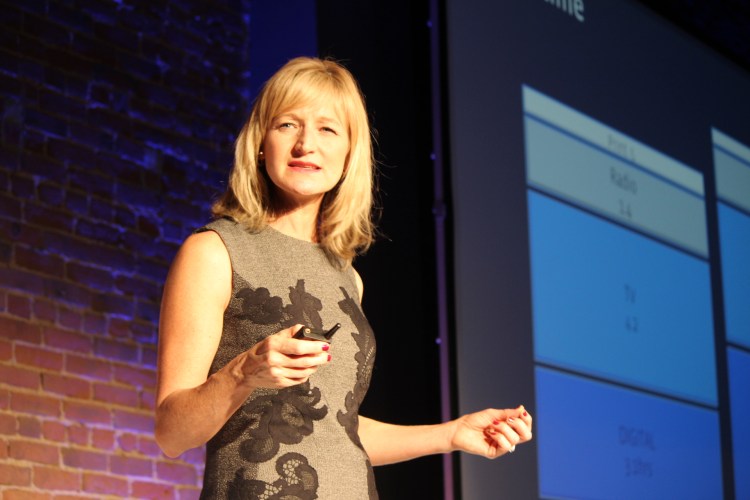SAN FRANCISCO — Facebook’s head of tech and telco marketing Jane Schachtel said that mobile marketers in particular must go the extra mile to make sure they treat consumers like people.
Mobile devices are highly personal, she says, so the advertising content presented on them must be carefully personalized.
The reward for marketers who do that well is significant. Schachtel said only $16 billion, or about two percent, of the total worldwide ad spend will be spent on mobile next year. That means there’s lots of room for growth. “This presents a huge opportunity,” she told the crowd here at the Mobile First conference Thursday.
People’s relationships with their mobile devices have gotten more substantive and complex. “People used to go to the mobile web to find one specific thing,” Schachtel says.
“Then came the feed. … Now people discover, they share.” When they do that, they leave lots of information (yes, on sites like Facebook) that marketers can use to get to know prospective customers better.
But not even Facebook has all the data needed to engage with mobile consumers. “No one company has all the data,” Schachtel said. “It’s just a lot of companies with a lot of data.”
Mobile developer or publisher?
Learn how the most successful developers get better users for less money.
It’s the careful combination of various kinds of information that allows marketers to fully personalize and target ads at consumers. “That big data we hear people always talking about is really all about relevance,” she said.
The results of having the right mixture of demographic, purchasing, product ownership, and demographic data can be impressive, Schachtel said.
When you have data on what products people currently have, and when they bought them, then combine that with data on their social activity, you can pinpoint down to a science what people you want to reach and when you want to reach them, she said.
“This is bringing people back,” Schachtel said. “This is making business personal again.”
But that’s still not enough. Marketers also need a way to track the effectiveness of ads the consumer might see online or offline, or on any of a number of mobile devices. They need to be able to attribute an eventual sale to the ad that “connected” somewhere along way — the one that moved the consumer toward a purchase.
This has traditionally been done using cookies, or small bits of HTML code installed in users’ browsers to track brand interaction. But on mobile, cookies aren’t as good for this, Schachtel said.
She said cookies overstate the number of people an ad reaches, or underestimate how many times people see an ad (possibly on different devices). So they can’t reliably track which ads may have led to a purchase.
This neatly led Schachtel into a plug for Facebook’s Atlas ad tracking service. “That’s Atlas,” she said. “With Atlas you have a powerful system where marketers can measure engagement across devices.”
And then she left.
VentureBeat's mission is to be a digital town square for technical decision-makers to gain knowledge about transformative enterprise technology and transact. Learn More

